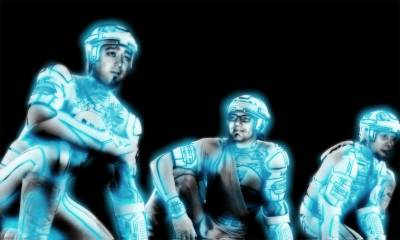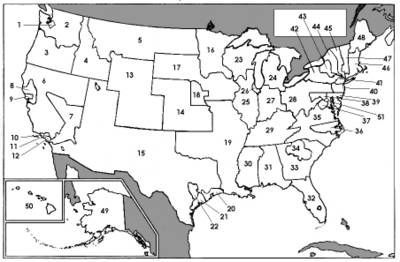Monday, February 21, 2005
Wednesday, February 09, 2005
The Corporate States of America in the 21st Century (version 1.7)
As the United States looks into the 21st century and assumes its global role as the "Effigy of Democracy and Capitalism," it may find itself looking to corporations more and more for winning business strategies (read: political and cultural advancement). However, if routine economic practices continue to go unchecked it is very possible that its democratic crown could be thrown to the ground and overcome by wanton capitalism.
In this unfortunate (speculated) instance, a federal restructuring of the nation would, no doubt, take place. In such a process, the Phoenix of corporate control would rise from the ashes of this former federal government. This Phoenix, much like its predecessor, would use slave labor (the consumer) to work its dirty business and would reshape culture (consumerism) in efforts to create a new category of nation. What better way to institutionalize the monument to the 20th century American economy than to hand over the reigns of land to the private sector and let them do what they may with it?
We have taken the time to create a fictitious extrapolation of a future dominated by the true power houses of American culture: the corporations.
Based on statistical data from the Fortune 500 top grossing companies along with US corporations possessing strong social/cultural/historical significance, we decided that the future of corporate rule would allow for each corporation to assume its allotted land in the region of its headquarters. In some cases not every deserving corporation could be given land since there’s just not enough to go around. Further, it is understood that many corporate entities would most likely prefer to conquer foreign nations. We also decided that the natural selection of corporate warfare (also known as corporate Darwinism) would perhaps weed out some of the less-deserving companies allowing for a more plausible division of the current land that the United States government has willingly made available to the highest bidder.
Note that the CSA (Corporate States of America) would serve primarily as administrative hubs for multinational operations that generously provide job-creation opportunities for poverty-stricken regions of the world. The CSA would also provide a marketing front that allows for its said employee partners (read: undernourished, underpaid sweatshop workers) to sell, while not being able to actually consume, goods and services on a limited basis to the richest 10% of the world’s population.
In a cursory evaluation of the traditional domains of social practice (social, cultural, economic, religious, political, and geographical) the CSA would function as follows:
POLITICAL DOMAIN OF SOCIAL PRACTICE: Political systems in this fictitious nation would require that the NASDAQ and the Dow Jones 30 serve as the 2 branches of the federal government. CEO's would serve as ex officio governors. The former United States government would continue to function in its current manner, serving as the international protector of business (while simultaneously acting as its corporate whipping-boy). The United States military would also continue to function as an intimidating and powerful "rent-a-cop," leading the global corporate advance into new lands available for acquisition, thereby continuing its celebrated imperialistic history. Finally, the District of Columbia would be the only recognizable property in the CSA but would no longer stand as a political epicenter. Rather, Washington, DC would become first, a public affairs/public relations filter for the CSA and second, a memorial to the missionary-turned-slave trader who founded the stepsister of the CSA showing the world how slave trade birthed an illegitimate corporate nation.
CULTURAL DOMAIN OF SOCIAL PRACTICE: Culturally, consumer confidence would replace patriotism and living above one’s means a sign of nationalism.
ECONOMIC DOMAIN OF SOCIAL PRACTICE: Economically and financially speaking, the Word Bank/IMF issued credit card would be required by all citizens of the CSA and be used in lieu of passports. Debt would be viewed as a commodity that could be bought and sold, causing interest rates to be viewed as the heart monitor indicating the vitality of CSA's livelihood. Globally, all currencies would be valued against the CSA dollar with the understanding that the CSA dollar would become the universal currency by the end of the century.
GEOGRAPHICAL DOMAIN OF SOCIAL PRACTICE: Geographically, zip codes would be replaced by bank account numbers and state abbreviations would be replaced by stock symbols. State lines would be redrawn at the end of each fiscal year and water rights would be rewarded proportionally in regard to quarterly earnings reports.
RELIGIOUS DOMAIN OF SOCIAL PRACTICE: The religious domain of social practice is the hardest to speculate on. However, it can be assumed that a new religion would be created. In this new religion there would be opportunity to buy shares of heaven (stock symbol: G$d). Theology would be replaced by economic philosophy. Clergy would be replaced by stock brokers and financial advisors. Church services would be replaced with open board meetings. Warren Buffet would serve functionally as the pope and Omaha (hometown of Warren) would assume a Jerusalem/Vatican City/Mecca status.
Map of the Corporate States of America
KEY to MAP:
1. District of Starbucks
2. Microsoft
3. Nike
4. Albertsons
5. McDonalds
6. Chevron
7. West Disney-Vegas
8. New Hewlett Packard Compaq
9. Commonwealth of Wells Fargo
10. District of Universal
11. District of MGM
12. District of Hollywood
13. West Monsanto
14. East Monsanto
15. Exxon Mobil
16. Target
17. ConAgra
18. Commonwealth of Berkshire Hathaway
19. Walmart
20. The Enron Strip* (Enron Territory)
21. Hewlett Packard Compaq
22. SBC Communications
23. West Ford GM
24. East Ford GM
25. Boeing
26. Commonwealth of Bank One
27. Procter & Gamble
28. American Electric Power
29. Phillip Morris
30. The WorldCom Territories (Louisiana Purchase v.3.0)
31. Pepsi Coca Cola
32. East Disney-Vegas
33. Home Depot
34. Bell South
35. Duke Energy
36. Commonwealth of the Bank of America-Wachovia
37. Freddie Mac
38. Fannie Mae
39. Merck
40. Johnson & Johnson
41. Commonwealth of Citigroup
42. Verizon
43. AIG
44. JP Morgan Stanley
45. Pfizer
46. General Electric
47. IBM
48. CVS
49. Texaco Territory (Colony of Chevron)
50. Old Hawaii Territories (the Municipal Territories of CEO/GOV)
51. District of Columbia
*disputed land/worker ownership region
LEGEND:
1, 10, 11, 12, 51: Districts: While not officially States (revenues not comparable to most of the other corporations), their cultural/social meme forming status deserves recognition.
23, 24: East and West Ford/GM: In a surprising reversal of anti-trust laws, all American automotive corporations would be forced to merge in efforts to fight off growing competition from Japanese car makers. This industrial powerhouse's valuable role would keep the CSA mobile therefore East and West Ford/GM would be given precedence of use over the Great Lakes as a corporate perk.
9, 18, 26, 36, 41 : Commonwealths: The CSA Commonwealths would be given special permission for legal relief allowing for a broader publicly owned local economy.
30 : The Louisiana Purchase version 3.0 (a.k.a. “How the West Was Bought”): In light of the inevitable demise of World Com, a 3rd option for the Louisiana Purchase would be auctioned to the highest corporate bidder. Inquiries to its former owners could be made at the initiation of potential buyers (former owners include: World Com, the former government of the USA now known as the Consumer States of America, and the Native Americans)
13, 14, 17: Breadbasket: The modern breadbasket of the CSA would serve as the food creation center, creating new methods for increased agricultural production and modified post-organic food sources.
15: Exxon/Mobil: Due to the sheer size of this mega corporation, Exxon/Mobil assumes a boundary as large as its incoming revenue.
7: West Disney-Vegas: Disney World and Disney Land, representing the entertainment industry, would be granted a large area in the west to form a symbiotic relationship with the existing Las Vegas entertainment industry.
41-47: Vanguard States: It would not be possible for every business to have a piece of the corporate pie in the highly sought-after "Old New York Cluster" region. Several leading corporations would have to be chosen by the legislature to be "Vanguard States." These Vanguard States would consequentially be given a radial piece of the pie from the epicenter of what was once known as New York.
30, 49, 50: Territories: Areas of land that maintain status either as colonies of corporations (i.e. Texaco, name splitting to differentiate the territory from the state), disputed land after a financial folding that maintains its boundary until corporately cannibalized, or zones of non-corporate specific ownership.
20: The Enron Strip: Having been invaded and conquered by its greedy neighbors, former board members, share holders, employees, and faithful customers would still honor the memory of Enron in the same way that nations such as Tibet are remembered.
50: Old Hawaii Territories (The Municipal Territories of CEO/GOV): Property of the former government of the USA, would be used as a retirement facility for long-standing career politicians and CEO’s.
51: Washington, D.C. (District of Columbia):
NOT LISTED: Puerto Rico, US Virgin Islands, and Guam: Used as vacation hotspots for corporate CEO's
Cuba: Would serve as the new base of operations for the former USA military


